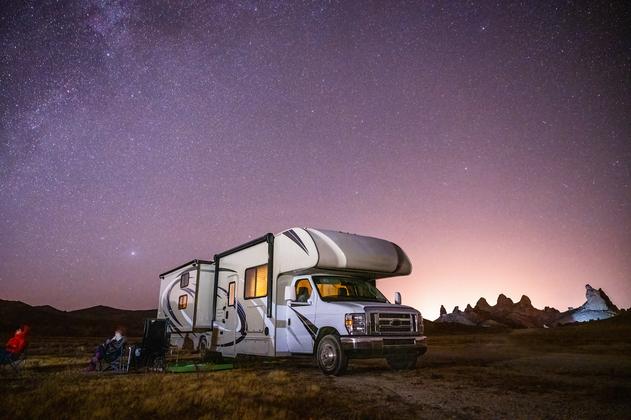
We may receive payment from affiliate links included within this content. Our affiliate partners do not influence our editorial opinions or analysis. To learn more, see our Advertiser Disclosure.
When you’re driving an RV — a vehicle with a price tag anywhere from about $35,000 to $300,000 — you want to know it’s properly insured. That’s an issue more than 11 million U.S. households should confront.
Like insurance policies for the cars parked in your garage or driveway, insurance policies for RVs vary based on factors such as where you live and what kind of RV you own. Here’s what you need to know about insuring your RV so that your adventures aren’t tripped up by financial woes due to accidents and mishaps.
Related: Compare Rates On Car And RV Insurance With EverQuote
Whether you need RV insurance depends on what kind of RV you own.
In nearly every state, you need to buy insurance for an RV if it’s considered a motorhome. In short, a motorhome is a home on wheels that can be driven. Only two states, New Hampshire and Virginia, don’t mandate RV insurance, just as they don’t require liability insurance for cars. However, it’s smart to buy both auto and RV coverage in those two states.

It’s worth noting that if you finance the purchase of a motorhome, the lender generally will insist that you carry liability insurance as well as comprehensive and collision coverage.
Now, if you can tow your RV, such as a camper or trailer, you normally don’t need to buy a standalone RV insurance policy. That’s because auto insurance likely covers this type of RV. You can, however, buy extra coverage for a towable RV.
If you’re buying RV insurance, what sort of coverage can you expect to get? Normally, it’s the same sort of coverage you’ve purchased for your cars. Here’s a rundown of the basic coverage:
Related: Compare Rates On Car And RV Insurance With EverQuote
Aside from that broad-based coverage, your insurance might offer optional RV coverage such as:
An auto insurance company (like Allstate, Farmers, Nationwide, Progressive or State Farm) or a specialty insurer will weigh several factors when figuring out how much it’ll cost to insure your RV. These include:
One key to determining the cost of your coverage is the class of RV that you own: A, B or C.
Class A RVs cost the most to insure, followed by Class C and Class B.
The yearly insurance premium for an RV may range from $200 to more than $2,000. You may qualify for a variety of discounts if, for instance, you’ve maintained a clean driving record or you’ve got more than one policy with the same insurer (known as bundling).
Related: Compare Rates On Car And RV Insurance With EverQuote
Keep in mind that if you file a claim under the comprehensive or collision portions of your RV policy, you’ll have a deductible (such as $500 or $1,000). That dollar amount will reduce the claim payout. So, if an insurer agrees to pay $10,000 for a collision claim and you’ve got a $1,000 deductible, your claim check would total $9,000.